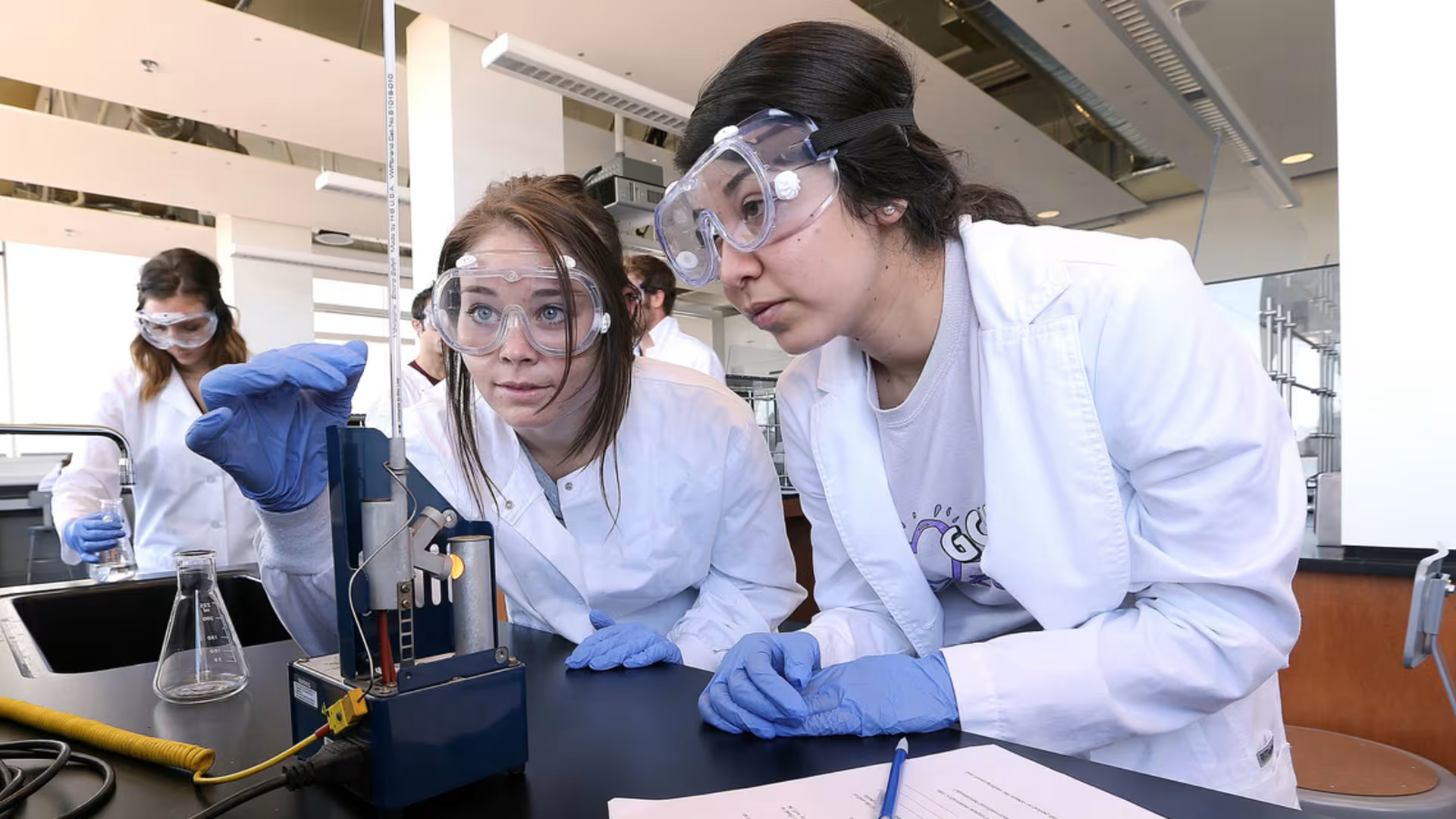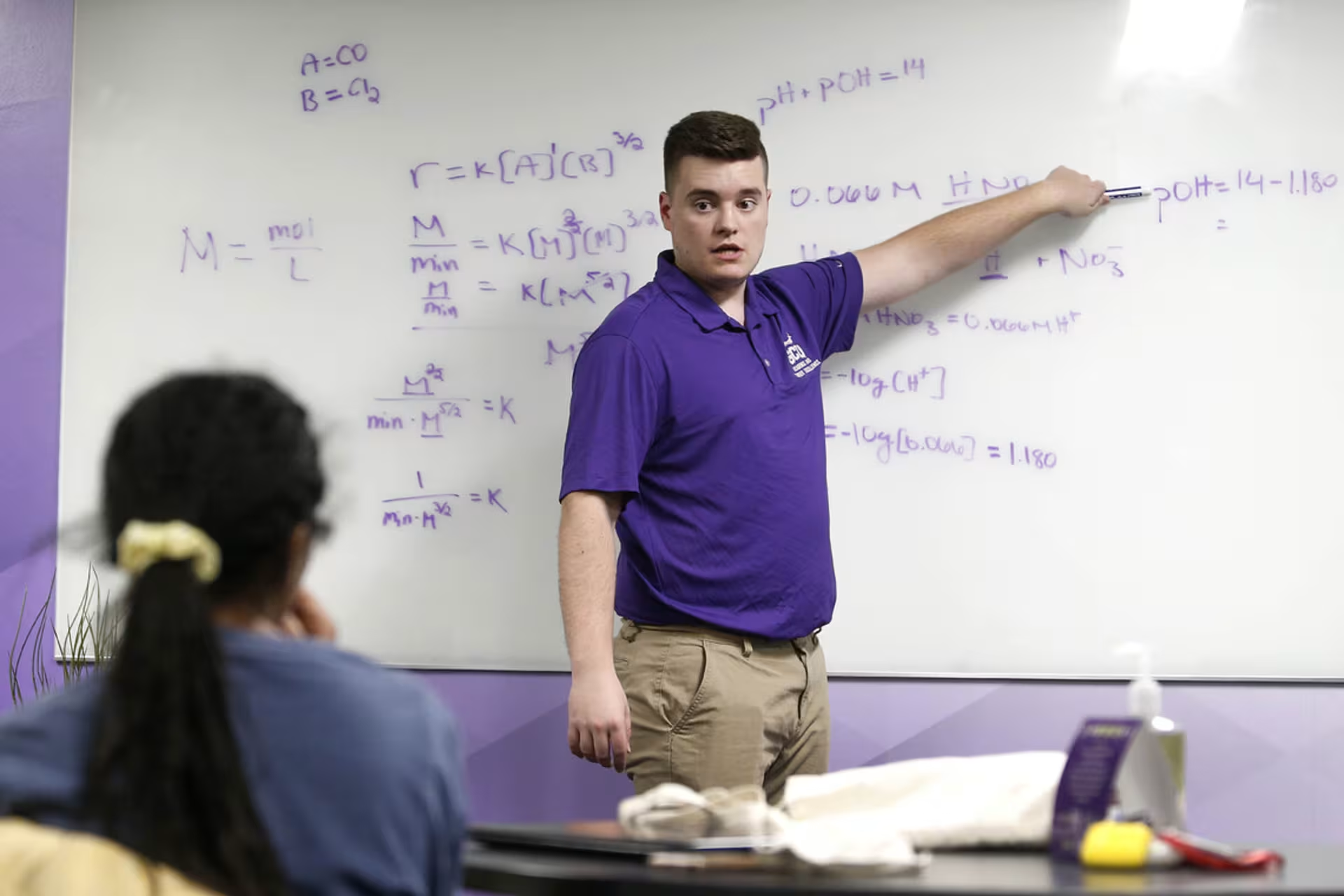
Master’s in Chemistry: Education Emphasis
Elevate Your Impact as a Chemistry Educator
The Master of Science in Chemistry with an Emphasis in Education from Grand Canyon University helps prepare chemistry professionals for new career opportunities and offers advanced training in teaching, scientific inquiry and practical applications of chemistry concepts. You will be taught how to teach undergraduate chemistry courses including mechanisms of disease, therapeutics and advanced chemistry concepts such as the physical, chemical and atomic properties of matter.
This degree is designed to improve the content and pedagogical knowledge of future postsecondary chemistry teachers who often require a doctoral degree for university-level positions.(See disclaimer 1) However, some community colleges may accept a master’s degree or relevant work experience in lieu of a doctoral degree.(See disclaimer 1) If you already hold a teaching license and are looking for more advanced career opportunities, this program may be ideal for you.

Online: $615 per credit [More Info]
Up to 12 credits or 1/3 of the total program requirements in transfer (whichever is less)
Credits: Fill out the Lopes Eval to find out what will transfer
Admission Requirements (Master's)
- Undergraduate Degree*
- 2.8+ GPA
OR 2.5+ Unweighted GPA and
- GMAT: 500
- GRE: 300 combined**
Admission requirements may differ based on degree level, program and modality, or transfer status. Some programs of study may require a higher GPA and/or other qualifying criteria for admission. Please review full admission and program requirements in the University Policy Handbook.
* Degree must be from an accredited college or program that has been approved by GCU.
** Combined verbal/quantitative, after August 2011 (1,000 combined verbal and quantitative, prior to August 2011).

Earn Your Master’s in Chemistry at GCU
Future STEM professionals — scientists, technologists, engineers and mathematicians — need a firm foundation of science competencies. As students, many of these future STEM professionals will be required to take chemistry at the college level.(See disclaimer 2) As STEM fields continue to grow, so too will the need for postsecondary teachers to educate the next generation of scientists, engineers and researchers.(See disclaimer 3) Transitioning to this career path can be an ideal way to pursue your passion for science education while helping to meet the need for qualified educators in the chemistry discipline.
Choose an Online Master’s in Chemistry: Education Emphasis
GCU offers this degree online for working professionals. Online classes are designed to help you advance your chemistry knowledge while managing current responsibilities, with coursework accessible anytime and from nearly anywhere. You will receive support from knowledgeable faculty, helping you efficiently further your education and qualifications.
Secondary Chemistry Education Course Topics
The program covers effective pedagogy skills, including whole-class and group work strategies, and applies learning theories in the classroom. You will have the opportunity to lead classroom dialogue and utilize effective instructional methods through the development of activities, assessments and lesson plans, covering topics such as:
Blend Your Passions for Teaching and Science
The primary focus of this master’s program is to enhance your chemistry knowledge and teaching skills essential for postsecondary educators. It can prepare you to apply instructional methods effectively and navigate the university teaching landscape, including online environments, where strong communication skills are crucial.(See disclaimer 1)
As a student in this program, you will receive instruction on developing your teaching abilities through instruction that covers both theoretical and practical aspects of both science and instruction.
Career Paths for Graduates in Advanced Chemistry Education
Graduates of this online master’s in chemistry program may choose to pursue opportunities to teach chemistry at the postsecondary level.
You may pursue employment opportunities in the following settings:(See disclaimer 4)
Postsecondary teachers often need a doctoral degree, though a master's or work experience may be sufficient at some community colleges.(See disclaimer 1) Qualified postsecondary teachers are essential for preparing future STEM professionals to pursue careers in science and technology. The U.S. Bureau of Labor Statistics (BLS) Occupational Outlook Handbook estimates job growth for all types of postsecondary teachers to increase by about 8% from 2022 to 2032, faster than average, accounting for an estimated increase of 108,100 jobs in the field.(See disclaimer 3)
Estimated 108,100 new jobs for postsecondary teachers from 2022 to 20323
Earn Your Master's Degree Through an Accredited University
GCU has been institutionally accredited by the Higher Learning Commission since 1968 and is proud to prioritize quality education and comprehensive instruction. The College of Natural Sciences shares the university’s commitment to upholding the principles and standards established by our accrediting bodies.
Master’s in Chemistry: Education Emphasis FAQs
If you value sharing your chemistry knowledge with upcoming generations of STEM professionals, we’ve prepared answers to your most frequently asked questions about pursuing this master’s degree in chemistry.
What is chemistry education?
What education is needed to become a chemistry teacher?
Is a master’s in chemistry worth it?
Is an MS in chemistry education emphasis difficult?
Program Curriculum
Core Courses

Prepare to make a positive contribution as a postsecondary chemistry educator.
- U.S. Bureau of Labor Statistics. (2024, April 17). How to Become a Postsecondary Teacher. Occupational Outlook Handbook. Retrieved Aug. 5, 2024.
- BigFuture. (n.d.). Science, Technology, Engineering and Math Majors and Degrees. CollegeBoard. Retrieved Aug. 5, 2024.
- COVID-19 has adversely affected the global economy and data from 2020 and 2022 may be atypical compared to prior years. Accordingly, data shown is effective September 2022, which can be found here: U.S. Bureau of Labor Statistics, Occupational Outlook Handbook, Postsecondary Teachers, retrieved on Aug. 5, 2024.
- U.S. Bureau of Labor Statistics. (2024, April 17). Postsecondary Teachers: Work Environment. Occupational Outlook Handbook. Retrieved Aug. 5, 2024.
- The earnings referenced were reported by the U.S. Bureau of Labor Statistics (BLS) Postsecondary Teachers, as of May 2023, retrieved on Aug. 5, 2024. Due to COVID-19, data from 2020 to 2023 may be atypical compared to prior years. BLS calculates the median using salaries of workers nationwide with varying levels of education and experience. It does not reflect the earnings of GCU graduates as postsecondary teachers, nor does it reflect the earnings of workers in one city or region of the country or a typical entry-level salary. Median income is the statistical midpoint for the range of salaries in a specific occupation. It represents what you would earn if you were paid more money than half the workers in an occupation, and less than half the workers in an occupation. It may give you a basis to estimate what you might earn at some point if you enter this career. Grand Canyon University can make no guarantees on individual graduates’ salaries. Your employability will be determined by numerous factors over which GCU has no control, such as the employer the graduate chooses to apply to, the graduate’s experience level, individual characteristics, skills, etc. against a pool of candidates.



